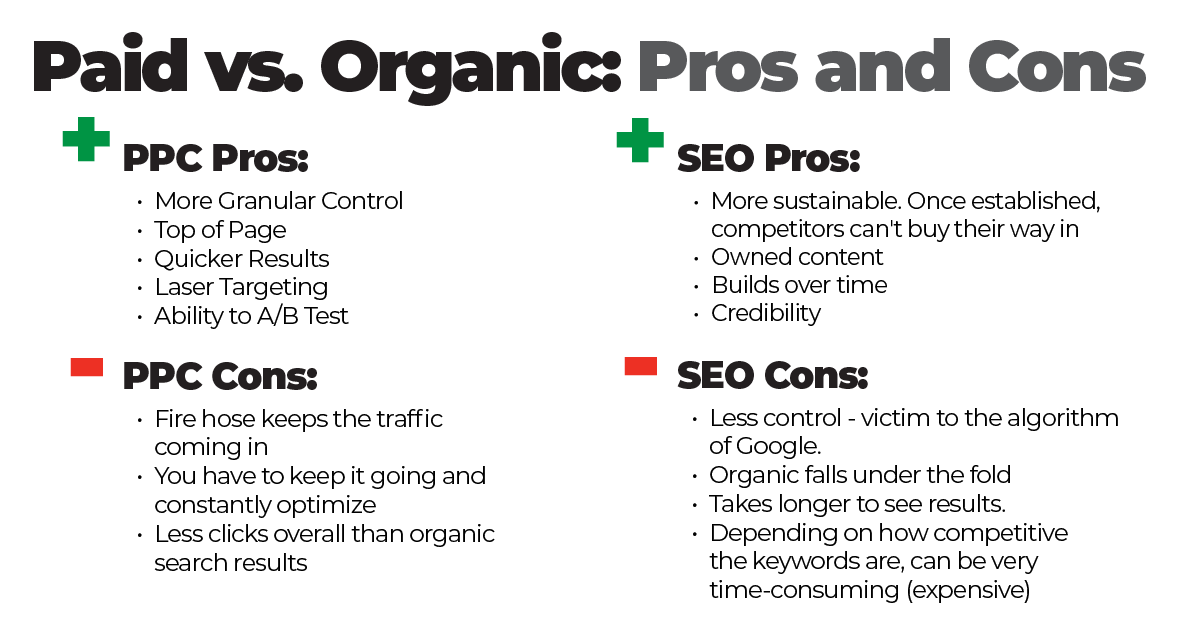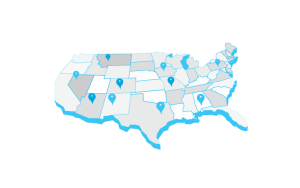SEO and PPC go together like coffee and tea (although without caffeine). These search engine marketing (SEM) strategies complement each other and drive web traffic to your site, ultimately growing your business. Combining the power of both SEO and PPC can generate twice the amount of data you’ll collect on click-through rates, exit and bounce rates, time on site, and conversion rates. How’s that for caffeinated? While many marketers view SEO and PPC as separate ideas, they’re actually both stronger when used together. Like peanut butter and jelly, coffee and donuts—you get the idea….
What is SEO?
SEO, or search engine optimization, is the process by which web developers and designers enhance a website so that its links rank higher on search engine results pages (SERPs) when specific keywords or phrases are used. Plain and simple. How rank is determined is a completely different subject which is based on search engine algorithms that are continually evolving. The most important thing to know about rank is that higher-ranked links provide more visibility and credibility and drive more organic (read, free) traffic.
Google drives 83% of global search traffic, followed by Bing at nine percent and Yahoo at 3 percent, so we’ll focus on Google here. Generally, for SEO, developers and designers can improve a website’s chances of a higher ranking in Google by:
- Increasing page loading speed
- Using targeted keywords in its copy, in its meta descriptions, and page titles
- Employing https for a secure site
- Including more respected backlinks in the site
- Staying abreast of changes to algorithms, as noted here in Google’s blog
- Increasing the overall word count on pages that could have thin content
- Regularly curating fresh new content for both new and existing pages
- Ensure you are following Google’s Expertise, Authoritativeness & Trustworthiness guidelines.
As you might expect, the results from SEO can often take weeks, months, or longer to fully manifest, but when they do they are long lasting and lucrative.
What is PPC?
PPC, or pay-per-click advertising, refers to the type of advertising sold by search engines, social media, and other websites. Advertisers pay the platform when a user clicks on their ad, hence the name. These ads can be text only or can contain images or videos. They are usually posted at the top or along the sides of a webpage, in heavily trafficked and high-value real estate, and are carefully constructed to elicit clicks.
PPC is usually an affordable strategy to drive traffic and leads to your site. However, the cost varies depending upon the keyword or phrase that you purchase. This is priced at the market rate, depending upon how frequently that keyword or phrase is searched. More popular phrases or words can command a higher PPC.
Results from a PPC campaign are immediate and trackable, but they usually dissolve once the campaign has ended. That’s why both SEO and PPC need to be used in tandem. Both SEO and PPC aim to bring more traffic to the site and ultimately, more conversions that drive business.
How do SEO and PPC Help Each Other?
While purchasing PPC ads does not affect your rankings and using SEO strategies will not affect your PPC ads, there are some smart ways that you can get PPC and SEO working together to increase your traffic and build your visibility. Each strategy provides important information that can inform the success of the other. Here is how you can leverage both:
Use PPC Campaigns to Test for SEO
It can be difficult to know which keywords or phrases will pull well for your site’s SEO without revamping the site and incurring time and money. One easy and affordable way to determine this is by purchasing keywords or phrases in a PPC campaign that you think are highly relevant and relatively popular (the sweet spot for keywords) for your site. Then monitor their performance. The keywords and phrases that perform well are worth integrating into your site through the content and metadata. Those that do not do well are not worth pursuing. On the flip side, any information gleaned from SEO over time can also help direct the PPC campaign to make it more effective as well.
Make Two Plus Two Equal Five
Like many strategies, the sum of SEO and PPC far outweighs their individual contributions. The goal of SEO is to help your page rank toward the top since the top organic listing commands a 29% click-through rate (CTR), and then it drops to 15% and 11% in the next two, with only a 2.5% CTR for the tenth spot. When you couple those numbers with a PPC ad for the same keyword or phrase that has a bid high enough to ensure the top one or two spots, you’re ensuring that your site is listed more often on the results page, which builds credibility and increases qualified traffic. This is especially good for those who prefer to trust organic listings more than advertised links.
Provide Air Cover
PPC ads provide more “air cover” for SEO. Even if a user clicks on a PPC ad, takes a moment exploring the site, and then ultimately leaves, they have learned more about your company. Once they are familiar with a brand, it will be easier for them to click on the organically ranked links in the future. PPC ranks provide air cover that lends both awareness and credibility to a brand.
Related: How to Boost Your Organic SEO
Remarket for Reminding
Your product or service may require a lengthy purchase decision making process. In that case, it’s helpful to remarket your brand to visitors who have expressed interest in your site before, to keep any searches top of mind as they work their way through the process. This can be accomplished with a targeted remarketing PPC campaign that reminds them when the time is right by showing them ads across other sites that they’re visiting.
Prevent Loss of PPC Traffic
When your site organically ranks number one, it may seem counterintuitive to also pay for a PPC campaign that places your link near the top of the page. However, Google research shows that hitting pause on a PPC campaign can significantly affect incremental traffic since 89% of PPC traffic is not replaced by SEO efforts. Although your site may be ranked first organically, it will be hurt if you pause the PPC campaign—you’re missing additional searches that you won’t receive another way. And if your site is not ranked first, PPC will help boost that number. On the flip side, Google’s research shows that a website with great organic search results garners increased PPC CTR rates on the same SERP.

SEO & PPC For The Win
SEO and PPC do indeed go together like coffee and tea—or cream and sugar—or whatever other combination that suits your fancy. When you employ both strategies, they have the added effect of lifting the traffic volume and ultimately driving more leads to grow your business. At Ironmark, we’ve been studying the nuances of digital advertising for decades, and love the challenge of creating campaigns that consistently hit the mark. Engage us today in your conversations and let’s put SEO and PPC to work for your brand!



